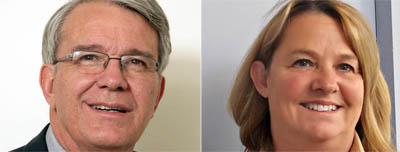Latest News Archive
Please select Category, Year, and then Month to display items
14 November 2024
|
Story André Damons
|
Photo André Damons
 Staff members from the Directorate Research Development (DRD) at the University of the Free State; Palesa Mgaga, second from right, Tebogo Machethe, centre, and Charelise van Staden, second from right, were thanked for hosting the launch of the Khoebo Innovation Promotion Programme. They are pictured with colleagues from the IDC’s Samkelisiwe Mtsewu, left, and Thato Mogopodi, far right.
Staff members from the Directorate Research Development (DRD) at the University of the Free State; Palesa Mgaga, second from right, Tebogo Machethe, centre, and Charelise van Staden, second from right, were thanked for hosting the launch of the Khoebo Innovation Promotion Programme. They are pictured with colleagues from the IDC’s Samkelisiwe Mtsewu, left, and Thato Mogopodi, far right.
The University of the Free State (UFS), represented by the Directorate Research Development (DRD), played host to the Department of Trade Industry and Competition (dtic) and the Industrial Development Corporation (IDC) for the launch of its Khoebo Innovation Promotion Programme (KIPP).
The launch took place on 5 November in the Sasol Library on the Bloemfontein Campus. Tebogo Machethe, Director: Research Contracts and Innovation at the DRD, said its role was to expose the university researchers to different opportunities and programmes for funding from the IDC and the dtic. It also allowed the researchers to engage potential funders in order to understand what funders look for in a project when considering funding it.
“The aim of IDC KIPP is to assist local entrepreneurs and small to medium enterprises with commercialisation funding. The KIPP offers capital and business support to SMMEs during the early stages of commercialisation with particular emphasis on township and rural entrepreneurs,” said Machethe.
Address uneven distribution of economic development
KIPP is a dtic programme but is managed by the IDC and aims to enable early-stage innovative SMEs to penetrate the market with their locally developed innovations, resulting in a more competitive economic environment and thereby facilitating economic growth in the economy.
According to Machethe, who welcomed the guests, participants and presenters to the launch, some of the funding is geared towards the development of university innovations. Though the focus was on the KIPP launch, he continued, the discussions also encompassed other forms of funding that are available and more geared towards the university innovation.
His address was centred around the university's Vision 130 and how it supports innovation and the entire innovation ecosystem, which seeks to shift the emphasis to research impact, embracing both knowledge and societal impact. Vision 130 identifies the need for a greater focus on collaborative research, research that can attract large-scale funding in niche areas where the university is seen as a national and global leader.
Samkelisiwe Mtsewu, KIPP Account Manager at the IDC, said the programme was introduced to address the uneven distribution of economic development across the country. She said with its capacity, the KIPP programme can contribute to addressing the uneven distribution of economic development.
UFS welcomes two new deans in the faculties of Theology and Law
2014-08-04
 |
The university council has approved the appointment of two deans: Prof Fanie Snyman, at the Faculty of Theology and Prof Caroline Nicholson, at the Faculty of Law.
Both professors offer the university a wealth of knowledge and experience in research and teaching.
Prof Fanie Snyman
Prof Snyman joined the university in 1984 as a senior lecturer in the Department Old Testament. His career followed a steadfast ascent which led him to attaining the title of professor and head of department the following year. On 1 July 2013, Prof Snyman took on the additional role of acting dean of the faculty.
As dean, he set out a clear vision of academic leadership with four primary focus areas: research, teaching and learning, internationalisation and regional engagement.
He is the author of eight books and contributed to seven internationally- and twelve nationally-published books. He has published nine articles in international journals and about 60 more in accredited journals.
Prof Snyman proposes to bring staff members together to extensively rethink and reposition the faculty in terms of identity, transformation and the way forward. “We live in a complex world, characterised by uncertainty and in constant change. This calls for complex but also innovative solutions,” he says.
Prof Caroline Nicholson
Prof Caroline Nicholson was born in Scotland and came to South Africa as a young child. She obtained her BProc and LLB degrees at the University of the Witwatersrand and completed her articles of clerkship at Chernin’s in Hyde Park Corner, Johannesburg. Prof Nicholson was admitted as both an attorney and notary public of the then Supreme Court of South Africa in 1986.
In 1986 she joined the University of South Africa (UNISA ) as a lecturer and remained there until 1999. During this time she completed an LLM in Banking Law and an LLD in Comparative Conflict of Laws – focusing on international parental child abduction. During the same year she moved to the Faculty of Law at the University of Pretoria where she worked for the last fifteen years. In 2003 she completed a Postgraduate Diploma in Alternative Dispute Resolution (ADR) and has an abiding interest in ADR, especially within the Family Law context.
Prof Nicholson has produced numerous articles and research presentations on a variety of legal subjects. Her primary areas of interest are, however, legal education and child law. She is known both nationally and internationally for her research contributions.